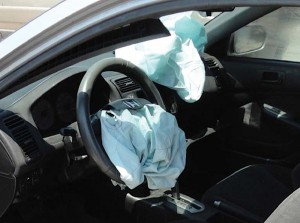Toyota Motor Corp. and Nissan Motor Co., Japan’s two largest automakers, have announced another major recall to fix potentially faulty Takata airbags, a move affecting a total of 6.5 million vehicles, about 1 million of them sold in the U.S.
All told, nearly 30 million vehicles have been recalled as a result of the problem, which can cause airbags to inflate over-aggressively in a crash, sending shrapnel flying into the passenger compartment. The problem has so far been linked to a half-dozen deaths, most of them in the United States.
The latest actions may not spell the end of the Takata problem, however, as some safety advocates are calling for the recall of as many as 30 million vehicles equipped with suspect Takata airbags in the U.S. alone.
Honda Motor Co., which has a close relationship with Takata and had so far ordered the largest number of airbag recalls, said it is studying the latest issue before deciding whether to announce any new service actions.
Toyota has issued a recall order covering 5 million vehicles sold globally to replace the inflators used in 35 different models, including such popular products as the RAV4 sport-utility vehicle. About 637,000 of the vehicles were sold in the States. As with other Takata airbag recalls, they are older vehicles produced between March 2003 and November 2007.
In this case, however, the front passenger and driver airbags can deploy abnormally, or rupture, in a crash.
As for Nissan, it is adding another 1.56 million vehicles to its prior list of Takata recalls, with 326,000 of them sold in North America. That includes such models as the Sentra compact and the X-Trail sport-utility vehicle.
All told, Nissan has now recalled about 4 million vehicles due to problems with Takata airbags, while Toyota has covered 8.1 million vehicles equipped with the supplier’s supplemental restraint system.
“Toyota’s focus remains on the safety and security of our customers,” said Dino Triantafyllos, chief quality officer at Toyota Motor North America.
(Takata-based recalls hammer Honda earnings. For more, Click Here.)
Prior to today’s announcement, 10 different automakers had already recalled 22 million cars, trucks and crossovers worldwide to inspect and, if necessary, replace the inflators in Takata airbag systems. The latest recall announcements stand out because the vast majority of the vehicles were sold in Japan and other overseas markets. Until now, 17 million of the recalled vehicles were sold in the U.S.
Experts remain puzzled about precisely what is causing Takata airbags to inflate in such a violent manner. Initial studies have suggested the problem may be most severe among vehicles operated in areas with high humidity, which led to initial geographic-based recalls focusing on states like Florida and Louisiana, as well as the territory of Puerto Rico.
(Click Here for details about Honda’s expansion of its Takata-based recalls.)
But several incidents, including at least two deaths, have occurred in areas not covered by those actions, leading critics to contend that humidity is, at most, a contributing factor. Clarence Ditlow, director of the Washington-based Center for Auto Safety, said his non-profit group believes the pyrotechnic material used for Takata’s airbag inflators may break down as it ages, leading it to fire too rapidly.
The National Highway Traffic Safety Administration has been pressing Takata to expand its recall, a move the supplier has resisted, insisting there is no evidence to support such a move. But Honda, Toyota and Nissan, among other automakers, have added vehicles to their recall list anyway.
(To see why GM is recalling 520,000 Malibus, Canyons and Colorados, Click Here.)
Meanwhile, NHTSA has been fining Takata $14,000 per day since Feb. 20 for reportedly providing documents to the agency without the required explanation of what they contain. The fines have already topped $1 million.


There is almost zero possibility that Takata was not aware of a product defect at some point within the ~30 million unit’s production.